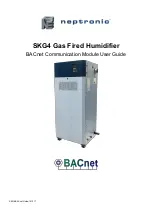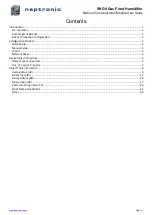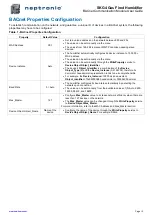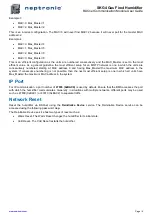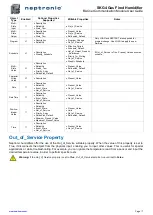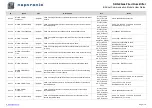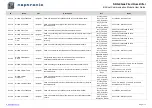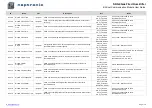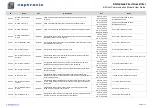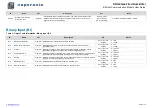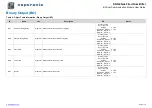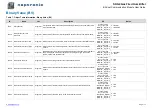
SKG4 Gas Fired Humidifier
BACnet Communication Module User Guide
Page | 3
Configuration Options
The following Configuration options enable you to configure and run the BACnet features of the humidifiers quickly.
Quick Setup
Configure the humidifier for BACnet communication without programming.
1.
Ensure that no other device on the network has a MAC address of 1 (the humidifier's default address).
2.
Connect the humidifier to the network and power it up.
3.
The humidifier automatically configures the baud rate and device instance allowing BACnet Property
Configuration through the Write Property service. See Table 1 - BACnet Properties Configuration.
4.
Repeat the steps for each humidifier.
Manual Setup
Configure the humidifier for BACnet communication using the SKG4 controller, by using the following steps:
1.
Press the Enter key.
2.
Enter the Integration menu password:
5544
.
3.
Select the Network or Communication sub-menus to set appropriate values.
4.
Follow the instructions to configure the Device, BACnet Server, BACnet MSTP/IP and so on, manually.
5.
Disconnect the power to the humidifier, connect the humidifier to the network, and connect the power
again.
MAC Address and Max_Master
The MAC address must be unique on the entire MS/TP network. However, having a unique MAC address and a high
baud rate does not guarantee efficient operation of the humidifier and other MS/TP units on the MS/TP network. Some
MAC address and Max_Master combinations are more efficient than others. BACnet requires token-passing units to
occasionally “poll” for other masters based on the MAC address and Max_Master.
A poor combination of MAC addresses and Max_Master can lead to a slower network due to lost time polling for
masters that are not present. Unless there are 126 other units on the MS/TP network, the default Max_Master value of
127 is not the most efficient choice for the humidifier. The Max_Master default value of 127 was selected to ensure
that any master, specifically a BACnet client can be found when the humidifier is initially started.
Examples of MAC Address and Max_Master Configurations
The following are some of the examples to indicate the optimum combination of MAC address and Max_Master
configurations to ensure a quick and efficient output.
Example 1
•
MAC=0. Max_Master=127
•
MAC=1, Max_Master=127
This configuration is slow and inefficient because every time either unit is required to find another master unit, it has to
poll 126 units until it finds the right one to pass the token.
Example 2
•
MAC=0. Max_Master=5
•
MAC=1 to MAC=4 are not used
•
MAC=5, Max_Master=5
This configuration is better than Example 1 but it is still not optimal. The Max_Master is set to the most efficient value
but the gap between the two MAC addresses is high. Therefore, each unit must poll four units until it finds the right
one to pass the token.

